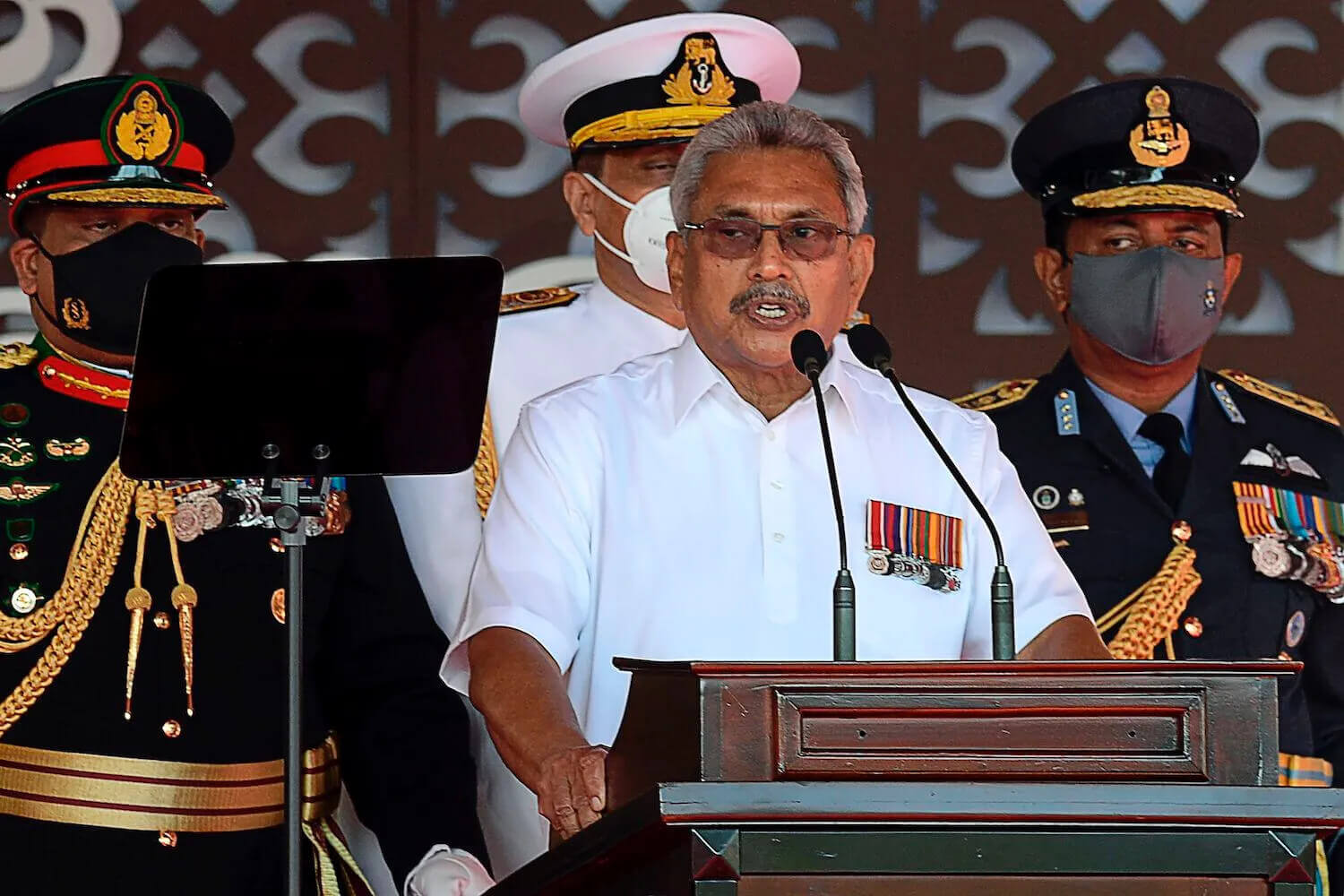A South Africa-based rights organisation filed a criminal complaint in Singapore seeking the arrest of exiled Sri Lankan President Gotabaya Rajapaksa, accusing him not just of corruption but also of committing war crimes during the 25-year civil war that ended in 2009. After facing months of mass protests, Rajapaksa fled to Singapore in mid-July.
A press release by the International Truth and Justice Project (ITJP) reported that a 63-paged complaint had been filed with Singapore’s Attorney General over Rajapaksa’s role in the “grave breaches of the Geneva Convention” during the civil war, given that he served as the secretary of the ministry of defence from 2005 to 2015. The civil war ended 25 years of fighting between the Tamil minority separatists and Sinhalese-backed government forces, both of whom were accused of committing mass atrocities and crimes.
The complaint also highlighted Rajapaksa’s role as a military commander in 1989, when 700 civilians disappeared from a district under his watch. However, it predominantly focussed on his role as defence secretary, accusing him of murder, execution, torture and inhumane treatment, rape and other forms of sexual violence, deprivation of liberty, severe bodily and mental harm, and starvation.
Please note - Press release explaining the action against . @GotabayaR in #singapore now online in 3 languages - English, #tamil & #sinhalahttps://t.co/O2BXXDmPTL@agcsingapore https://t.co/peunUaKANZ
— ITJP (@itjpsl) July 24, 2022
It presented evidence of Rajapaksa’s involvement in “repeated and deliberate strikes by the army on civilians,” including those in bunkers that were killed while queuing for food and receiving medical treatment. The air force also attacked United Nations offices, with Rajapaksa previously having admitted that the air force could “pinpoint targets” and “planned and renewed every strike.”
Moreover, the complaint showed that Rajapaksa had decided to “expel aid workers” to “hide the extent of human suffering.” Additionally, he blocked the supply of life-saving medicine and food to civilians despite being informed of the dire situation.
“The international community must now exert maximum pressure to see that the Rajapaksas are brought to justice and that Singapore steps up to its international obligations,” Jeyaretnam said. https://t.co/pnn1oVz1Ph
— Kenneth Jeyaretnam (@KenJeyaretnam) July 25, 2022
Furthermore, the group stressed that Rajapaksa had urged military commanders to “hurry and end the war” in May 2009, following which witnesses reported “soldiers executing in cold blood injured fighters who were unarmed and civilians trying to surrender.”
Several Tamil civilians were extrajudicially killed and routinely murdered, raped, tortured, and even abducted and then fed to crocodiles. At least 40,000 were killed in the Mullivaikkal massacre towards the end of the war, when the government told Tamil civilians to flee to “no-fire zones” with the promise of shelter but then tortured, raped, mutilated, and shot at. Moreover, tens of thousands of people remain unaccounted for, although Rajapaksa admitted later to a UN envoy that they were all dead.
Also Read: The Wounds of Sri Lankan Tamils Can’t Heal So Long As the Rajapaksas Are in Power
The ITJP release highlighted that while Rajapaksa and his family had approved the surrender plan of the Liberation Tigers of Tamil Eelam, he simultaneously ordered the execution of Tamil leaders. The surrender has not yet been investigated, even 13 years since the Paranagama Commission’s call for a judicial inquiry.
An international lawyer that drafted the complaint explained that Rajapaksa is subject to Singapore’s domestic laws under universal jurisdiction, which applies when an individual has committed” crimes that are of concern to humanity as a whole.” Moreover, Rajapaksa has lost his previously-held immunity as a head of state by resigning.
Press release https://t.co/bBZ43HYxTP on Gotabaya Rajapaksa complaint in California pic.twitter.com/mWQEjKFM5D
— ITJP (@itjpsl) June 26, 2019
She thus urged Singapore to use the opportunity to “protect the world from a man who has a hideous history of gross violations of human rights.” She said, “Serial perpetrators must face trial, not be issued visas.”
Speaking of the country’s deteriorating economy, ITJP’s executive director, Yasmin Sooka, said that the crisis is “really linked to structural impunity for serious international crimes going back three decades or more.” To this end, she argued that Rajapaksa is not only responsible for corruption and economic mismanagement but also for “mass atrocity crimes.” Keeping this in mind, the rights group has called for Rajapaksa’s immediate arrest.
Also Read: India Cannot Leave Its Sri Lankan Tamil Refugees In Limbo Any Longer
🇱🇰#SriLanka: We are alarmed by the unnecessary use of force by security forces to break up a protest camp near presidential offices in Colombo. We condemn reports of beatings of protesters, journalists & lawyers & urge authorities to halt the use of force: https://t.co/soUkZO3i0a pic.twitter.com/Oc9cZIpq0F
— UN Human Rights (@UNHumanRights) July 22, 2022
The press release said that opposition leader Kenneth Jeyaretnam, who is of Sri Lankan origin, has welcomed the call for Rajapaksa’s arrest. He said that his exile to Singapore was “disgraceful and a deliberate affront” to Singapore’s Tamils and all Sri Lankans, whose family members were killed or had to flee the island nation. In this regard, he urged Singaporean authorities to step up to their international obligations and ensure that the Rajapaksas are “brought to justice.”
There has been no comment from the Attorney General’s chambers. However, a spokesperson confirmed that the office had received the letter on July 23.
Moreover, India Today reported that Singaporean authorities are looking to remove Rajapaksa from the country and have refused to extend his stay. In fact, the Immigration and Checkpoints Authority clarified that the now-former president has not applied for asylum and that the authorities would assess his visa extension on a “case-by-case basis.”

